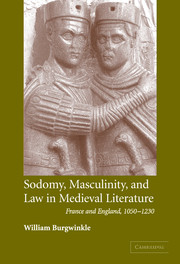Book contents
- Frontmatter
- Contents
- Acknowledgments
- Prologue
- Introduction
- Part I Locating sodomy
- Part II Confronting sodomy
- 3 Making Perceval: double-binding and sièges périlleux
- 4 Queering the Celtic: Marie de France and the men who don't marry
- 5 Writing the self: Alain de Lille's De planctu naturae
- Conclusion
- Notes
- Bibliography
- Index
- CAMBRIDGE STUDIES IN MEDIEVAL LITERATURE
4 - Queering the Celtic: Marie de France and the men who don't marry
Published online by Cambridge University Press: 22 September 2009
- Frontmatter
- Contents
- Acknowledgments
- Prologue
- Introduction
- Part I Locating sodomy
- Part II Confronting sodomy
- 3 Making Perceval: double-binding and sièges périlleux
- 4 Queering the Celtic: Marie de France and the men who don't marry
- 5 Writing the self: Alain de Lille's De planctu naturae
- Conclusion
- Notes
- Bibliography
- Index
- CAMBRIDGE STUDIES IN MEDIEVAL LITERATURE
Summary
Women are given in marriage, taken in battle, exchanged for favors, sent as tribute, traded, bought, and sold. … Men are of course also trafficked – but as slaves, hustlers, athletic stars, serfs, or as some other catastrophic social status, rather than as men.
Our own historical accounts, insofar as they replicate and support the dominant view of a Middle Ages that is “naturally,” effortlessly, monolithically Christian, masculinist, and heterosexual, erase the particular sites of struggle at which the female, Jewish, “heretical,” queer resisted silencing even as they were brought to silence. … We can intervene … to hear, in however muted and distorted a fashion, the queer presences against which that homophobia was anxiously erected.
In truth those who have such [same-sex] inclinations and desires are half-beast. They have shed the desirable element, their humanity, and in the sphere of conduct are made themselves like unto monsters. From levity to lewdness, from lewdness to lust, and finally, when hardened, they are drawn into every type of infamy and lawlessness.
The prologue to Marie de France's Lais offers, appropriately, several hints as to how the texts should be read. First, she defends hermeneutics, saying that texts worth our while are always difficult and demand an active reading style. It is the reader who brings to the text his/her own experience and thus the text's own “surplus.” This interactive model of interpretation is not new in the twelfth century, nor is it original to the Lais.
- Type
- Chapter
- Information
- Sodomy, Masculinity and Law in Medieval LiteratureFrance and England, 1050–1230, pp. 138 - 169Publisher: Cambridge University PressPrint publication year: 2004



